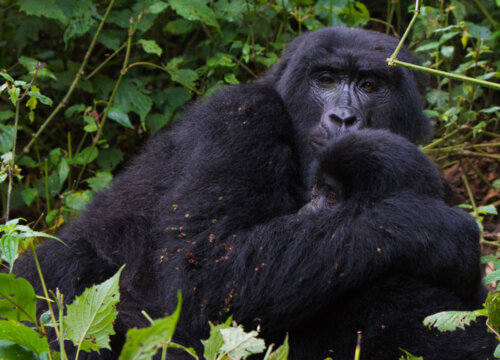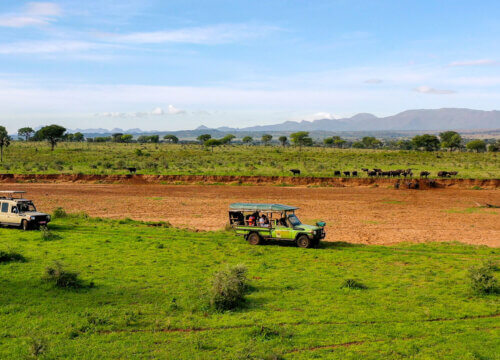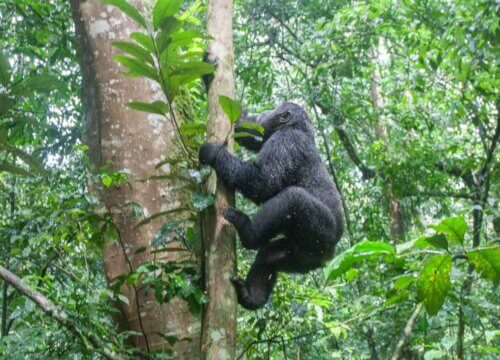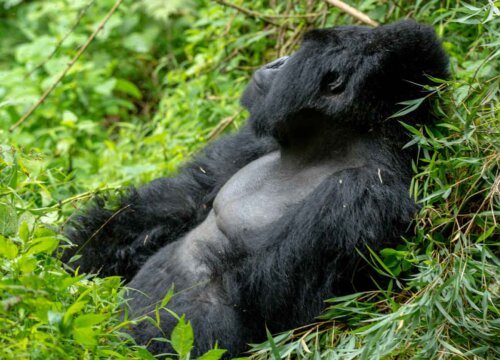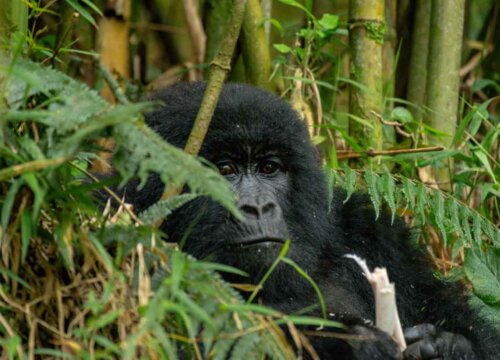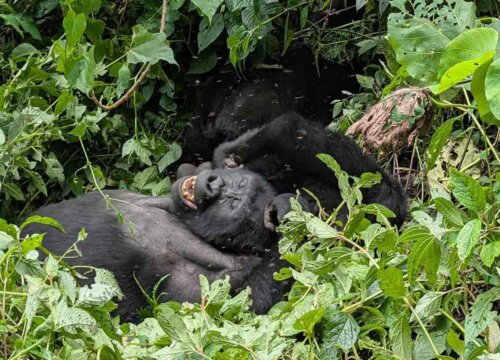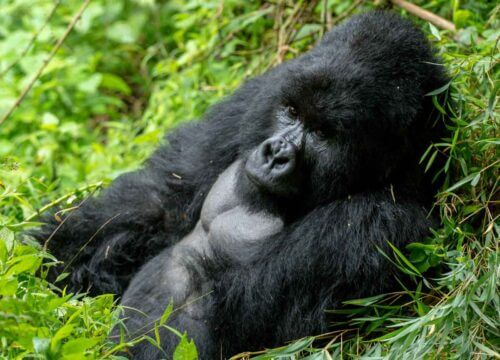Chimpanzee trekking without a permit in Kibale Forest National Park: is it possible?
Chimpanzee trekking without a permit in Kibale Forest National Park: is it possible?
As a rule, Chimpanzee trekking without a permit in Kibale is not possible, you need to have a permit issued by Uganda Wildlife Authority. Kibale Forest National Park is among the primary safari destinations in Uganda with more than 1500 chimpanzees. One of Kibale National Park’s main attractions is the opportunity to trek chimpanzees which is a memorable experience. To go on this exciting adventure, you need to have a chimpanzee trekking permit issued by Uganda Wildlife Authority. The permit is not just a formality because the funds collected from permits contribute to the protection and preservation of chimpanzees and their natural home. Additionally, the permit system helps regulate the number of visitors ensuring minimal human impact on the chimpanzees. A chimpanzee community can have more than 100 members headed by a democratically elected alpha male. The chimpanzee community is first habituated before the public is allowed to do chimpanzee trekking. Chimpanzee habituation is a process by which a team of researchers gets wild chimpanzee communities used to being in the presence of humans without changing their nature. Kibale Forest National Park currently has over 15 fully habituated chimpanzee communities. These split into smaller troops every day for feeding and a maximum of 6 people are allowed to visit them per session.
While it might be tempting to trek chimpanzees in Kibale National Park without a permit, it is important to respect the regulations set by the park authorities. These rules are in place to safeguard both the wildlife and the visitors and incase these rules are broken, expect a harsh punishment from Uganda Wildlife Authority. By obtaining a permit, you are not only securing your chance to see chimpanzees close but you are also supporting important conservation initiatives. To book your chimpanzee trekking permit, contact Giant Holiday Safaris.
Why book a chimpanzee trekking permit for Kibale Forest National Park?
Kibale Forest National Park has more than 1,500 chimpanzees and unlike zoos or sanctuaries, a chimpanzee trekking permit allows you to watch them for one hour while they are swinging through the trees, training one another or communicating with their signature hoots and calls. This is done when you are meters away from them. When you book a permit, you are not just allowed to access the forest but you are also getting the expertise of trained guides and rangers. These professionals lead you through the paths of Kibale Forest National Park sharing fascinating insights about chimpanzees and the forest ecosystem. The guides ensure that your trek is safe, educational and enjoyable. Your permit funds play an important role in helping to protect the forest, support anti-poaching measures and contribute to community development projects for example the communities whose crops have been destroyed by park animals that go astray. Kibale Forest National Park is not just about chimpanzees. It has more than 13 primate species like bush babies, black and white colobus, pottos, olive baboons, grey cheeked mangabey and blue monkeys. The park is also home to more than 325 bird species like Abyssinian ground thrush, yellow spotted nicator, blue breasted kingfisher, blue headed sunbirds and others.
Trekking through its beautiful greenery feels like stepping into another world, where every step reveals something that you have never seen. Chimpanzee trekking groups are also kept small so that you have a more personal and less crowded experience.
How can i book chimpanzee permits for Kibale Forest National Park
It is important to note that chimpanzee trekking in Kibale Forest National Park is a popular activity which means that booking your permits in advance is highly recommended. You can get permits through the Uganda Wildlife Authority (UWA) or use Giant Holiday Safaris, a trusted tour operator which is a convenient option because we handle all the logistics like securing your chimpanzee trekking permit, accommodation, transport and meals on your behalf. When we receive your chimpanzee trip inquiry, our travel consultant checks for permit availability from Uganda Wildlife Authority. You are then requested to pay for your permit as soon as possible because permit status changes at any time without warning. When booking your permit, be ready with your preferred trekking dates and personal details. Once your permit is secured, you are set for a memorable trip because Kibale Forest is home to more than 1,500 chimpanzees giving you a unique opportunity to see chimpanzees in their natural home.
How much does Chimpanzee trekking permits for Kibale National Park?
A chimpanzee trekking permit for Kibale National Park is 200 USD per person for foreign non-residents, 150 USD for foreign residents and UGX 150,000 for East African citizens. The permit guarantees your spot for the trek, caters for park entry fees, ranger guide fess, community support, security and government tax. It also contributes to conservation efforts and the protection of chimpanzees. A chimpanzee trekking permit does not cater for porter fees, accommodation fees, transport and other personal services.
What guarantees seeing chimpanzees in Kibale Forest National Park
Seeing chimpanzees in Kibale Forest National Park is 98% guaranteed because of many reasons. First and foremost, book a chimpanzee trekking permit so that you are part of a guided trek led by experienced park rangers. These experts have an intimate knowledge of the chimpanzees’ behavior and their daily routines for example they follow chimpanzee foot prints, freshly chewed foliage and fresh dung which increases your chances of a successful chimpanzee sighting without hassle. Timing is also key when planning your trek. Morning treks which start around 8:00 a.m are the best because chimpanzees are most active during this time usually looking for food, socializing or moving through the forest which makes it easier to locate and observe them. Kibale Forest National Park’s habituation program has made certain groups of chimpanzees get used to human presence which allows visitors to get closer to chimpanzees without disturbing their home. Choosing the chimpanzee habituation experience gives you more time with chimpanzees which gives you a deeper understanding of their lives. For any inquiries, contact Giant Holiday Safaris.
How safe is chimpanzee trekking in Kibale Forest National Park?
Chimpanzee trekking in Kibale Forest National Park is a safe experience with well-trained guides who escort each trekking group. These guides are knowledgeable about chimpanzee behavior and the forest environment. They ensure that you remain at a safe distance of 7 meters while still enjoying a close experience with chimpanzees. While trekking, you are let by two ranger guides one holding a machete and another one holding a riffle for security reasons. it is important to wear comfortable clothing, sturdy shoes and carry insect repellent to avoid stinging insects, harsh weather and harsh plants. You are also advised to look out for warning signs from chimpanzees for example walking on one leg, pulling of grass around them, throwing fruits and hooting. Once you notice any of these, do not panic but wait for the ranger to look for the cause of the action and follow his lead. Uganda security agencies offer extra protection to trekkers and forest dwellers which makes chimpanzee trekking a safe experience. For more information about your safety during the chimpanzee trekking experience, contact Giant Holiday Safaris.
What is the best time to book chimpanzee trekking trips for Kibale Forest National Park
Chimpanzees are active throughout the year but the dry seasons increase your chances of seeing chimpanzees in their home. The best time to book your trip is during the dry seasons which are from December to February and June to September. During these months, the trails are also less muddy which makes trekking easier and more enjoyable. Additionally, the weather is more predictable allowing you to fully immerse yourself in chimpanzee trekking without worrying about sudden heavy downpours. Alternatively, the wet season comes with advantages like reduced rates on transport and accommodation. It also favors trekkers that want a private and calm chimpanzee trekking experience though they are associated with muddy paths and scarcity of primate views since animals fear wet grounds. It is wise to book your permits in advance especially during peak dry seasons because chimpanzee trekking is a popular activity and permits get done quickly.
Is chimpanzee trekking in Kibale Forest National Park difficult?
The level of difficulty while doing Chimpanzee trekking in Kibale Forest National Park largely depends on your fitness level and the conditions on the day of your trek. The activity involves walking through dense forests, rough paths and sometimes steep slopes. While it is not overly tiring for most people, it can feel challenging if you are not used to hiking or physical activity. The trek usually takes between 2-4 hours depending on how quickly the tour guides locate the chimpanzees. During rainy seasons, the trails can become muddy and slippery which adds to the challenge but the guides are experienced and will pace the trek to suit the group offering breaks when needed. On the other hand, chimpanzee trekking during the dry season is easy because the paths are dry and passable. Chimpanzees are also easy to meet because they nap and feed closer to the ground.
What are the rules of chimpanzee trekking in Kibale Forest National Park
- Chimpanzees are wild animals and maintaining a safe distance is important. Visitors are required to stay at least 8 meters away from the chimpanzees.
- Follow your guide’s Instructions to ensure your safety and that of the animals. They are highly trained and knowledgeable about chimpanzee behavior and the forest ecosystem.
- Keep noise levels low because loud noises disturb chimpanzees. Speak in hushed tones and avoid sudden movements to ensure you do not scare away the chimpanzees or disrupt other wildlife.
- If you are feeling unwell or have symptoms of an illness, you may not be allowed to join the trek. This rule is to protect disease transmission to chimpanzees.
- Feeding the chimpanzees is strictly prohibited because it disrupts their natural feeding habits and also makes them dependent on humans or leads to aggressive behavior.
- Touching chimpanzees is not allowed.
- Stick to the paths marked by your guide to minimize your impact on the environment.
- To avoid overwhelming chimpanzees, visitors are allowed to spend only one hour watching them once they are located. This ensures minimal disruption to their daily routines.
- Flash photography is not allowed because it stresses chimpanzees.
- The age limit for chimpanzee trekking is 12 years. Trekkers should be 12 years and above because that age can withstand harsh trekking conditions.
Explorer More Safaris
- 14-Days Uganda Safari Gorilla Chimpanzees and Wildlife
- 12 Days Gorillas and Chimpanzees Wildlife Safari
- 10 days best of uganda primates & wildlife safari
- 6 Days Gorillas and Chimpanzee Trekking Safari
- 3 Day Bwindi Gorilla Trekking Safari
- 4 Day Uganda Gorilla Trekking and Wildlife Safari
- 4 Days Gorilla Trekking and Adventure Safari
- 5 Days Uganda Gorillas and Chimpanzee Tracking Safari
- 4-Day Rwanda Gorilla Trekking and Golden Monkey Tracking Safari
- 5 Day Gorilla Habituation and Chimp Trekking
- 4-Day Uganda & Rwanda Gorilla Trekking Tour
- 3 Days Bwindi Gorilla Trekking Ugnada from Rwanda
- 10 Days Uganda Primates and Game Safari

